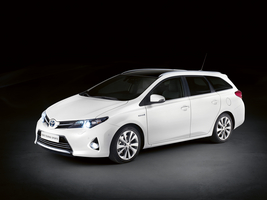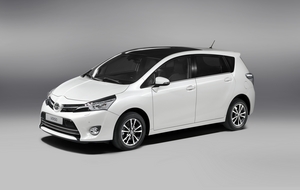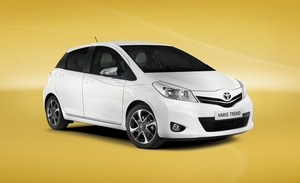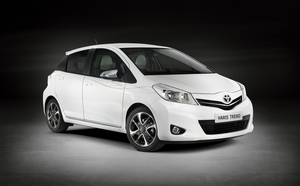|
Send this page to a friend! Fill in the form bellow | ||
Paris Motor Show
Toyota Updates Auris, Auris Sports Tourer and Verso to Paris
Toyota ToyotaJapan, 1937 > present155 models
ToyotaJapan, 1937 > present155 models
4570 photos
10 videos
has three new cars to debut at the Paris Motor Show on September 27. It has brought new generations of the Auris Toyota Toyota Auris Gen.3Japan, 2012 > present78 versions
Toyota Toyota Auris Gen.3Japan, 2012 > present78 versions
90 photos
, Auris Touring Sports and Verso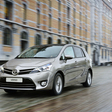 Toyota Verso Gen.1Japan, 2001 > present53 versions
Toyota Verso Gen.1Japan, 2001 > present53 versions
88 photos
. It also has a hybrid Auris and Yaris Trend aimed at younger buyers.
Auris
The Auris and Auris Touring Sports wagon are both getting new styling and engine upgrades as part of Toyota’s European C-Segment model surge. Toyota wants to make its cars more dynamic and fun to drive to pull in more buyers. The new car is lighter and more aerodynamic to improve its fuel efficiency as well.
It will be offered in four trim levels: Active, Icon, Sport and Excel. Prices start at £14,495.
The new Auris is 30mm longer than the previous model, but the wheelbase is the same at 2.6m. The extra length adds 15mm to the front overhand and 15mm to the rear overhang. The ride height is 10mm lower, and the seats sit 45mm lower. Despite the minor changes, weight is 40kg lower.
Inside, the new seats increase rear knee room by 20mm, and the load space is 50mm longer. The cargo area can hold 360l. Toyota has worked to improve the interior over the old model by making the quality better. The car uses a mix of satin silver trim and soft touch materials.
Like the new Verso, the Auris uses Toyota’s Under Priority design language, which leads to a sharp nose and thick C-pillar. The new car also gets LED running lights and top models gets HID headlights. The design improves aerodynamics and helps the car get better fuel economy than the old model. The drag coefficient has been reduced from 0.292 to 0.28.
Power comes from one of four engines: a 1.33l petrol with 99hp and stop/start, a 1.6l petrol with 132hp, a 1.4l diesel with 90hp, a 2.0l diesel with 124hp and stop/start and a hybrid with 136hp. The 1.33l and 1.4l use a torsion beam rear suspension, and the 1.6l, 2.0l and hybrid have a double wishbone rear suspension. The average CO2 emissions of all the engines are 109g/km of CO2. Toyota expects sales to be 33% hybrid, 33% diesel and 33% petrol.
The petrol and diesel engines come standard with a six-speed manual. A CVT is optional on the 1.6-liter petrol engine, and another CVT comes standard on the hybrid model. The hybrid engine is only available on the Icon and Excel trims.
All Auris models come standard with LED running lights, automatic air conditioning, USB stereo, electric front windows and heated side mirrors. The Icon trim adds 16in wheels, a touch screen infotainment screen, Bluetooth, rear-view camera, leather steering wheel, front fog lights and electric rear windows. The Sport grade adds 17in wheels, sport front seats, sport grill, rear diffuser and tinted rear glass. The Excel trim is the top of the line with velour and leather seats, dual-zone climate control, smart key, cruise control, rain-sensing wipers, automatic headlights, auto-dimming rear view mirror, parking assist and heated front seats.
All models will be available with optional parking assist that allows the car to park itself with driver input. Satellite navigation and a touch screen infotainment system are also available on all trims. There is also a panoramic sunroof that is 2.34m long and 1.28m wide and full leather interior optional on the Excel trim.
The prices in the rest of Europe have not been confirmed and are up to the individual countries to decide.
Verso
Toyota has upgraded the Verso MPV with over 470 changed parts, lower emissions and lower interior noise levels. The car still seats seven passengers. There is now 975mm between the first and second row of seats. There is 155l of cargo volume behind the third row of seats and 440l with the third row folded down.
The new Verso gets a dramatic front upgrade with Toyota’s Under Priority design language. It has a low, curving nose that is similar to the Prius. The B-pillar is invisible and matches the windows, and the C-pillar is thick like on the Prius. All models will get LED running lights, and top trim models will HID lights. One of the major new options will be the 2.4m long, 1.2m wide panoramic sunroof.
The Verso is also getting interior upgrades with new soft touch trim, lacquer black paint and Nappa leather door trim on some models. All models also get chrome trim on the instrument surrounds, air vents, gearshift and door grips. All cars also get larger seat bolsters for a more supportive seat. The interior upgrades also lower noise and vibration in the car.
The new Verso will be offered with four engines. None of them are technically new, but all of them have improved CO2 emissions compared to previous versions. The base engine is a 2.0-liter diesel with 126hp and a six-speed manual transmission. It produces 130g/km of CO2. There is a 2.2-liter diesel with 177hp and either a six-speed manual or automatic. There are also two petrol engines: a 1.6-liter with 132hp and a 1.8-liter with 147hp. Both petrol engines come with a manual transmission, but the 1.8-liter gets a CVT as an option.
Toyota expects to sell 50,000 units a year of the Verso in 2013. It will be offered in three trim levels: Live, Active and Lounge.
There will also be a new Verso at the show that will get a 2.0-liter D-4D diesel engine with lower CO2 emissions. Toyota also says the new generation will have a better interior with lower noise levels.
Yaris Trend
Toyota also has a new trim of the Yaris Toyota Yaris 3Japan, 2011 > present99 versions
Toyota Yaris 3Japan, 2011 > present99 versions
211 photos
called the Yaris Trend aimed at younger buyers. It gets unique exterior and interior pieces and new colors.
The Yaris Trend has chrome trim around the fog lights, headlights, door handles and doorsills. The B- and C-pillars are blacked out. It comes with two-tone 16in wheels, a roof spoiler and LED rear taillights.
The interior gets soft touch materials, a shorter gearshift and softer fabric on the seats.
GT86
Finally, Toyota will be promoting its recently released GT86 Toyota GT 86 Gen.1Japan, 2012 > present14 versions
Toyota GT 86 Gen.1Japan, 2012 > present14 versions
33 photos
1 video
with a new line of factory performance parts and a racing simulator at its booth. The performance parts were created by Toyota Racing Development and include aerodynamic and performance parts.
The racing simulator is an actual GT86 connected to a computer simulation that uses all of the actuals car's controls. Players accelerate, steer and brake using the actual car connected to a motion system and surround sound system. The windshield is replaced by an HD display.
Encyclopedia |
Contribute
latest articles



popular articles






